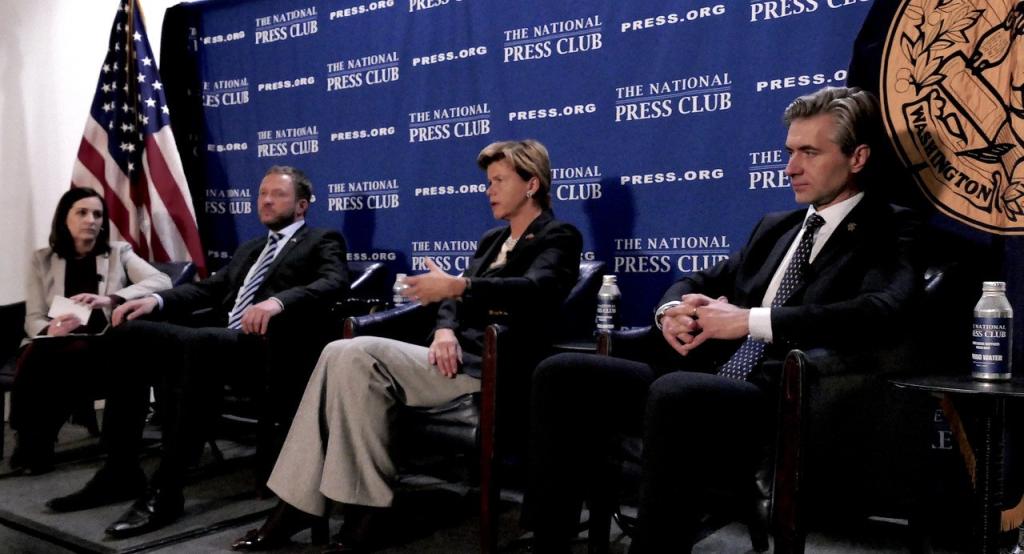Baltic leaders make case for containing Putin, boosting military spending, restoring USAID cuts
Foreign ministers of three Baltic nations made their case for stronger U.S. and European engagement to shore up their ability to resist potential invasion from Russia, as part of a wide-ranging conversation during a National Press Club Headliners Newsmaker event Thursday, Feb. 6.
All three also tiptoed around the delicate issue of President Donald Trump’s abrupt denunciation of and defunding for U.S. Agency for International Development programs, which provided millions in financial assistance to countries around the world.
“This review is really logical. There are many projects that are really useful,” said Margus Tsahkna, Estonian minister of foreign affairs. “There is a right for review ... but we hope for a quick restoration of joint projects,” added Baiba Braže, minister of foreign affairs for Latvia, noting USAID assistance for women in Ukraine who have been raped.

Kęstutis Budrys, Lithuanian minister of foreign affairs, said failure to restore USAID funds will simply open the door for countries like China and Russia to begin exerting additional influence on “weak regimes.”
The timely conversation was moderated by Jen Judson, a reporter for Defense News and a past Club president. The event was attended by a number of journalists who asked about wide ranging topics and submitted so many questions that it exceeded the time allotted for the event.
All three ministers were in town to hold meetings with administration leaders, relevant members of Congress and businesses to press their case for engagement when the U.S. government under the Trump administration seems preoccupied with many other topics besides Russian aggression.
“We’re living in a historical moment. Our main interest is European security with Russia,” Tsahkna said.
The Baltic leaders noted that their nations are all expected to become independent from Russian energy this month -- a careful arrangement that has them connecting to the West for natural gas and petroleum instead of buying it from Russia as they have previously. They also implied that Russian efforts to cut undersea cables poses a threat for the entire region, jeopardizing not only communications but also fuel.
“The Russian playbook is pretty straightforward. It's been there since KGB. The methods have changed and the disinformation is faster,” Braže said.
The meetings in Washington come just a week before a critical Munich Security Conference that begins on Valentine's Day in Germany and is expected to focus largely on the stalemate war between Russia and Ukraine.
All three leaders touted their increased military spending and promised eventually reaching 5% of their GDP. In Estonia, it’s currently 3.7% and Margus and that’s “not just because of Trump,” he added, reflecting the statement the president made repeatedly during his campaign that if he wins election European nations will have to spend more on their military rather than relying on U.S. funds.
The fear of another Russian invasion lies heavily on all three Baltic nations, and the foreign ministers all suggested that without more engagement by Europe and the U.S., Russian President Vladimir Putin may attempt to claim more territory.
“We have to stop aggression. But to stop the aggression we need the deterrence to stop Russia,” Budrys said.
He then cited a war game simulation that showed a Russian invasion of his country might succeed or fail depending on its level of military spending. In order to hold out against Russian infantry for a minimum of 10 days, he said, the country would need about $30 billion in new spending on its military. And Budrys said that Lithuanian leaders persuaded the “elites” of the country that more taxes were needed to generate revenue to achieve that sizable goal.
“There is not a single indicator that Russia is inclined towards peace,” Braže said.
